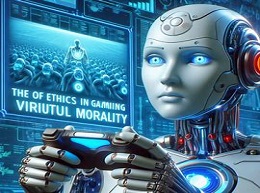The Ethics of AI in Gaming: Addressing Virtual Morality

The Intersection of AI and Gaming
The integration of artificial intelligence (AI) in gaming has revolutionized the industry, offering immersive experiences, adaptive gameplay, and lifelike characters. However, as AI becomes increasingly sophisticated, questions about the ethical implications of its use in gaming are coming to the forefront. In this article, we delve into the complex landscape of AI ethics in gaming, focusing on the concept of virtual morality and its implications for players and society.
Understanding Virtual Morality
Virtual morality refers to the ethical decisions and behaviors exhibited by AI-controlled characters within video games. These decisions often mirror real-world moral dilemmas, such as choosing between right and wrong, saving or sacrificing lives, and navigating complex social interactions. Developers employ various AI algorithms to imbue characters with moral agency, shaping player experiences and influencing narrative outcomes.
The Role of AI in Shaping Player Experiences
AI-driven virtual characters play a crucial role in shaping player experiences and narratives within games. Whether as allies, adversaries, or companions, these characters engage players in dynamic interactions, challenging their moral beliefs and decision-making processes. Games like "The Witcher 3: Wild Hunt" and "Detroit: Become Human" showcase the potential of AI to create morally complex worlds where player choices have far-reaching consequences.
Ethical Considerations in AI Gaming
The use of AI in gaming raises several ethical considerations, including the depiction of violence, stereotyping, and the reinforcement of social norms. Developers must navigate these ethical minefields carefully, balancing creative freedom with social responsibility. Moreover, the design of AI systems must prioritize inclusivity, diversity, and empathy, ensuring that virtual experiences reflect the values of an equitable society.
Examples of Ethical Dilemmas in AI Gaming
Several games have explored ethical dilemmas and moral choices through AI-driven narratives. In "The Last of Us Part II," players confront the consequences of their actions as they navigate a morally ambiguous post-apocalyptic world. Similarly, "Undertale" subverts traditional gaming tropes by allowing players to resolve conflicts peacefully and challenge the notion of victory through violence.
The Impact of AI on Societal Values
AI-driven gaming experiences have the potential to shape societal values and attitudes towards morality. By presenting players with moral dilemmas and ethical choices, games can foster empathy, critical thinking, and moral reasoning skills. However, they can also reinforce harmful stereotypes, perpetuate violence, and desensitize players to real-world issues.
Navigating the Ethics of AI in Gaming
In conclusion, the ethical implications of AI in gaming are multifaceted and complex, requiring careful consideration from developers, players, and society at large. As AI technology continues to advance, it is essential to prioritize ethical principles such as transparency, fairness, and inclusivity in game design. By fostering virtual worlds that reflect our shared values and aspirations, we can harness the transformative power of AI to create more meaningful, engaging, and socially responsible gaming experiences.